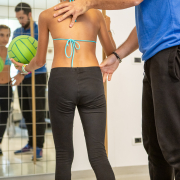Active self correction and stabilization: an Isico letter to the editor
It has just been published a letter to the editor “The active self-correction component of scoliosis-specific exercises has results in the long term, while the stabilization component is sufficient in the short term” in the scientific journal Prosthetics and Orthotics International.
“This is a comment to the study “Core stabilization exercises versus scoliosis-specific exercises in moderate idiopathic scoliosis treatment” –explains dr. Alessandra Negrini, Isico physiotherapist and author of the letter – the authors of the research compared two groups included Scientific Exercises Approach to Scoliosis (SEAS) and core stabilization. Scoliosis-specific exercise schools like SEAS include two main components: active self-correction (ASC) and stabilization. Consequently, a common intervention was provided to the two groups (stabilization) in this study, while the SEAS group also received ASC”.
Follow-up X-rays were taken after only 4 months. According to the Society on Scoliosis Orthopaedic and Rehabilitation Treatment (SOSORT)/Scoliosis Research Society (SRS) criteria, these results should be classified as a very short-term assessment. No significant difference was found between the two interventions. The patients were more adherent to the brace than to the exercise therapy. “Unfortunately, the authors did not mention if there was a difference in the adherence to bracing between the groups: this variable is expected to impact the results more than the type of exercises -adds dr. Negrini – Experts agree that stabilization exercises are more important during the first treatment phase (when the brace maintains for many hours every day the alignment of the spine and exercises are aimed to counteract muscle impairment). Exercises in ASC are more important in maintaining the obtained results when the brace weaning phase starts, when the patients should live sustaining in correction their spine without the brace support”.
It is important for the future to determine when to start ASC: immediately (even if it could add nothing to stabilization) or when weaning starts (when it could be too late)?
The full letter: https://pubmed.ncbi.nlm.nih.gov/32524898/

